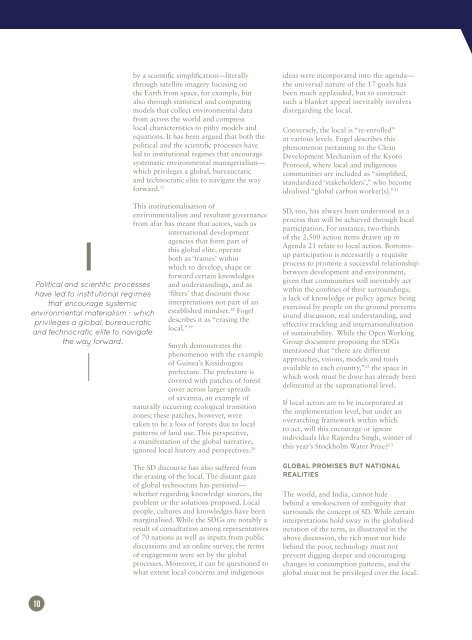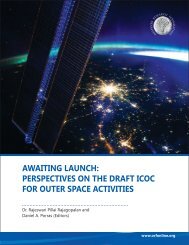Mathur Ritika Passi
zVAWsQ
zVAWsQ
Create successful ePaper yourself
Turn your PDF publications into a flip-book with our unique Google optimized e-Paper software.
Political and scientific processes<br />
have led to institutional regimes<br />
that encourage systemic<br />
environmental materialism - which<br />
privileges a global, bureaucratic<br />
and technocratic elite to navigate<br />
the way forward.<br />
by a scientific simplification—literally<br />
through satellite imagery focusing on<br />
the Earth from space, for example, but<br />
also through statistical and computing<br />
models that collect environmental data<br />
from across the world and compress<br />
local characteristics to pithy models and<br />
equations. It has been argued that both the<br />
political and the scientific processes have<br />
led to institutional regimes that encourage<br />
systematic environmental managerialism—<br />
which privileges a global, bureaucratic<br />
and technocratic elite to navigate the way<br />
forward. 17<br />
This institutionalisation of<br />
environmentalism and resultant governance<br />
from afar has meant that actors, such as<br />
international development<br />
agencies that form part of<br />
this global elite, operate<br />
both as ‘frames’ within<br />
which to develop, shape or<br />
forward certain knowledges<br />
and understandings, and as<br />
‘filters’ that discount those<br />
interpretations not part of an<br />
established mindset. 18 Fogel<br />
describes it as “erasing the<br />
local.” 19<br />
Smyth demonstrates the<br />
phenomenon with the example<br />
of Guinea’s Kissidougou<br />
prefecture. The prefecture is<br />
covered with patches of forest<br />
cover across larger spreads<br />
of savanna, an example of<br />
naturally occurring ecological transition<br />
zones; these patches, however, were<br />
taken to be a loss of forests due to local<br />
patterns of land use. This perspective,<br />
a manifestation of the global narrative,<br />
ignored local history and perspectives. 20<br />
The SD discourse has also suffered from<br />
the erasing of the local. The distant gaze<br />
of global technocrats has persisted—<br />
whether regarding knowledge sources, the<br />
problem or the solutions proposed. Local<br />
people, cultures and knowledges have been<br />
marginalised. While the SDGs are notably a<br />
result of consultation among representatives<br />
of 70 nations as well as inputs from public<br />
discussions and an online survey, the terms<br />
of engagement were set by the global<br />
processes. Moreover, it can be questioned to<br />
what extent local concerns and indigenous<br />
ideas were incorporated into the agenda—<br />
the universal nature of the 17 goals has<br />
been much applauded, but to construct<br />
such a blanket appeal inevitably involves<br />
disregarding the local.<br />
Conversely, the local is “re-enrolled”<br />
at various levels. Fogel describes this<br />
phenomenon pertaining to the Clean<br />
Development Mechanism of the Kyoto<br />
Protocol, where local and indigenous<br />
communities are included as “simplified,<br />
standardized ‘stakeholders’,” who become<br />
idealised “global carbon worker[s].” 21<br />
SD, too, has always been understood as a<br />
process that will be achieved through local<br />
participation. For instance, two-thirds<br />
of the 2,500 action items drawn up in<br />
Agenda 21 relate to local action. Bottomsup<br />
participation is necessarily a requisite<br />
process to promote a successful relationship<br />
between development and environment,<br />
given that communities will inevitably act<br />
within the confines of their surroundings;<br />
a lack of knowledge or policy agency being<br />
exercised by people on the ground prevents<br />
sound discussion, real understanding, and<br />
effective trackling and internationalisation<br />
of sustainability. While the Open Working<br />
Group document proposing the SDGs<br />
mentioned that “there are different<br />
approaches, visions, models and tools<br />
available to each country,” 22 the space in<br />
which work must be done has already been<br />
delineated at the supranational level.<br />
If local actors are to be incorporated at<br />
the implementation level, but under an<br />
overarching framework within which<br />
to act, will this encourage or ignore<br />
individuals like Rajendra Singh, winner of<br />
this year’s Stockholm Water Prize? 23<br />
Global Promises but National<br />
Realities<br />
The world, and India, cannot hide<br />
behind a smokescreen of ambiguity that<br />
surrounds the concept of SD. While certain<br />
interpretations hold sway in the globalised<br />
iteration of the term, as illustrated in the<br />
above discussion, the rich must not hide<br />
behind the poor, technology must not<br />
prevent digging deeper and encouraging<br />
changes in consumption patterns, and the<br />
global must not be privileged over the local.<br />
10








